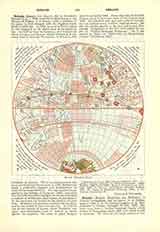

Behaim, ALBERT VON (known also as ALBERTUS BOHEMUS); B. C. 1180, probably at Boheiming, in the Diocese of Passau; d. at Passau, 1260; a partisan of the popes in their struggle with the Emperor Frederick II (1215-50). In 1205 he went to Rome, where he was employed at the papal court as an expert in law. In 1237 he went to Germany, and
Frederick of Austria. When excommunication was pronounced against the emperor in 1239, Behaim was made a permanent delegate and commissioned to make the sentence effective. For that purpose he appealed to the bishops of Germany (1240), and when they proved themselves negligent he excommunicated a number of ecclesiastics and laymen of prominence. At the same time, he worked for the election of a new king. However, his excessive severity had no effect, and he was forced to leave the country. In 1245 he was at the Council of Lyons, where Frederick was again excommunicated, and he worked as before against the emperor. His office of papal delegate through his efforts a league was formed against Frederick II between Otto of Bavaria, Wenceslaus of Bohemia, and came to an end in 1253. From that time he lived in Passau, where he had been dean of the chapter since 1246. He labored with zeal and credit to himself, but not without many conflicts, until his death. He left two diaries, known as the first and second Missivbuch. Fragments of the first were edited by Oefele, in “Rerum Boicarum Scriptores”, vol. I; the second by Hoffer in “Bibliothek des litterarischen Vereins” (Stuttgart, 1847).
FRANCIS J. SCHAEFER

